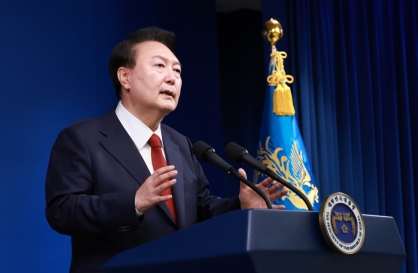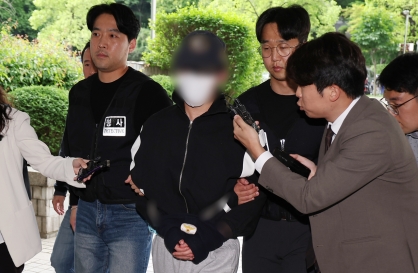North Koreans may think that it was fortunate that their leader, Kim Jong-il, officially anointed his successor more than a year before his death. But Kim died too soon to ensure his third son a smooth takeover as the ruler of the isolated, impoverished country of 24 million people.
Pompous funeral ceremonies for the dictator who ruled the Democratic People’s Republic of Korea for 17 years after the death of his father, Kim Il-sung, will be held on Dec. 28 in freezing Pyongyang. And no one knows what will happen after the mourning period as Kim Jong-un will start procedures to grab the multiple titles of his father in the party, state and military hierarchies.
Many scenarios are being put forward about how the new leadership will be formed in Pyongyang in the days ahead ― from an orderly transition with the three pillars of power pledging allegiance to the young leader, to a North Korean version of the “Jasmine Revolution” that has swept the Arab world since last spring.
Kim’s demise put on hold new moves to seek a breakthrough in the long stalemate in the five regional powers’ efforts to denuclearize North Korea. They included Washington’s direct contact with Pyongyang to discuss the North’s relatively new uranium enrichment program. A meeting between senior officials of the two countries scheduled for Thursday in Beijing is certain to be canceled although a resumption of the six-party talks was expected to be announced at the meeting.
Pyongyang authorities said no foreign condolence delegations would be accepted for the funeral, revealing circumstances which were keeping them from diverting their concerns to external affairs. Drawing up the list of the 232 funeral committee members topped by Gen. Kim Jong-un, vice chairman of the party’s Central Military Commission, must have been one of the difficult tasks they had during the two days between the death and its announcement.
It had been widely speculated that President Lee Myung-bak was making secret moves to hold a summit with Kim Jong-il sometime early next year to follow in the footsteps of his predecessors Kim Dae-jung and Roh Moo-hyun. It was ironic that Lee faces a similar situation to another conservative president, Kim Young-sam. His summit with Kim Il-sung did not materialize because of the North Korean founder’s death at the age of 82.
The fate of the DPRK dynasty is in question, with the ascent to power of a man whose leadership capabilities are unknown to his own people. They do not even know his correct age and they guess his father chose him from among his three sons just for his striking resemblance to his grandfather in appearance and mannerisms. They must be quite surprised to see that the names of first son Jong-nam and second son Jong-chol are not on the list of funeral committee members.
North Koreans were forced into communist rule under Kim Il-sung by the Soviets, who “liberated” them from the Japanese at the end of World War II. Since then, they have never had a chance to choose their leader by themselves. After more than six decades, they have arrived at a point where they could have an opportunity to change the course of their country under the most fragile leadership it has ever had.
A joint eulogy was prepared by the party’s Central Committee and Military Commission, the State Council, the state Defense Commission and the Supreme People’s Assembly. It said that Kim Jong-il died on the threshold of the “mighty, prosperous state … after heroically leading the country through extreme hardships of the crumbling of the world socialist system, the passing away of the Great Leader (Kim Il-sung), the anti-DPRK offensives by the imperialist alliance and the worst natural disasters.”
These words sounded like excuses for the present wretchedness of the North, plagued by food and energy shortages, meager foreign investment, and corruption and languidness in bureaucracy. The regime is barely kept in place by repression and regimentation of the people, privileges for the military and a false sense of pride in being a “feared nuclear power.” This is hardly a country that can be ruled by a novice leader, even with help from the ghosts of his father and grandfather.
Internal turmoil will grip the country when whatever reverence the people had of the dead leader dries up and whatever expectation they may have in the new leader is frustrated. South Koreans, who mostly had hoped that the Arab Spring this year would soon spread to the northern part of the Korean Peninsula, are now seeing the approach of a regime change ― and reunification ― with a greater sense of reality.
President Lee Myung-bak, who was readying himself for the wrap-up stage of his presidency, carrying on duties mainly in the area of the economy, is now facing a wholly new mission. He has to tighten up internal and external security, making intensive diplomatic endeavors to establish a consensus among the regional powers on how to deal with eventualities in the North. This job will be particularly important considering the political transitions to occur in countries with a particular stake in what happens on the Korean Peninsula.
The sudden death of Kim Jong-il increased uncertainty in Northeast Asia in 2012 at a time when the powers in the region are to undergo leadership changes one after the other. South Korea, China and Russia all have political schedules to replace their present heads of government. The United States, a superpower deeply involved in the region, has a presidential election in November and changes in the government of Japan have become an almost annual event.
China, as an emerging superpower sharing border with North Korea, will find itself in a most delicate position regarding the future of North Korea. Kim Jong-il had made his country almost a vassal state of China, with growing political and economic dependence under deepening international isolation, although he often acted against Chinese advice regarding his nuclear ambitions. Beijing will have to offer the same level of support for Kim Jong-un but will not attempt to monopolize relations with the North in view of maintaining the status quo in the region.
Washington, Moscow and Tokyo should also define their roles in coping with developments in North Korea, possibly through the six-power denuclearization process. It will take some time until Kim Jong-un’s North Korea finds itself ready to return to the multilateral process or a direct dialogue with the United States. In the meantime, these powers need to come to an agreement, tacit if not explicit, on South Korea’s stake in the northern half of the peninsula in the event the regime collapses.
Pompous funeral ceremonies for the dictator who ruled the Democratic People’s Republic of Korea for 17 years after the death of his father, Kim Il-sung, will be held on Dec. 28 in freezing Pyongyang. And no one knows what will happen after the mourning period as Kim Jong-un will start procedures to grab the multiple titles of his father in the party, state and military hierarchies.
Many scenarios are being put forward about how the new leadership will be formed in Pyongyang in the days ahead ― from an orderly transition with the three pillars of power pledging allegiance to the young leader, to a North Korean version of the “Jasmine Revolution” that has swept the Arab world since last spring.
Kim’s demise put on hold new moves to seek a breakthrough in the long stalemate in the five regional powers’ efforts to denuclearize North Korea. They included Washington’s direct contact with Pyongyang to discuss the North’s relatively new uranium enrichment program. A meeting between senior officials of the two countries scheduled for Thursday in Beijing is certain to be canceled although a resumption of the six-party talks was expected to be announced at the meeting.
Pyongyang authorities said no foreign condolence delegations would be accepted for the funeral, revealing circumstances which were keeping them from diverting their concerns to external affairs. Drawing up the list of the 232 funeral committee members topped by Gen. Kim Jong-un, vice chairman of the party’s Central Military Commission, must have been one of the difficult tasks they had during the two days between the death and its announcement.
It had been widely speculated that President Lee Myung-bak was making secret moves to hold a summit with Kim Jong-il sometime early next year to follow in the footsteps of his predecessors Kim Dae-jung and Roh Moo-hyun. It was ironic that Lee faces a similar situation to another conservative president, Kim Young-sam. His summit with Kim Il-sung did not materialize because of the North Korean founder’s death at the age of 82.
The fate of the DPRK dynasty is in question, with the ascent to power of a man whose leadership capabilities are unknown to his own people. They do not even know his correct age and they guess his father chose him from among his three sons just for his striking resemblance to his grandfather in appearance and mannerisms. They must be quite surprised to see that the names of first son Jong-nam and second son Jong-chol are not on the list of funeral committee members.
North Koreans were forced into communist rule under Kim Il-sung by the Soviets, who “liberated” them from the Japanese at the end of World War II. Since then, they have never had a chance to choose their leader by themselves. After more than six decades, they have arrived at a point where they could have an opportunity to change the course of their country under the most fragile leadership it has ever had.
A joint eulogy was prepared by the party’s Central Committee and Military Commission, the State Council, the state Defense Commission and the Supreme People’s Assembly. It said that Kim Jong-il died on the threshold of the “mighty, prosperous state … after heroically leading the country through extreme hardships of the crumbling of the world socialist system, the passing away of the Great Leader (Kim Il-sung), the anti-DPRK offensives by the imperialist alliance and the worst natural disasters.”
These words sounded like excuses for the present wretchedness of the North, plagued by food and energy shortages, meager foreign investment, and corruption and languidness in bureaucracy. The regime is barely kept in place by repression and regimentation of the people, privileges for the military and a false sense of pride in being a “feared nuclear power.” This is hardly a country that can be ruled by a novice leader, even with help from the ghosts of his father and grandfather.
Internal turmoil will grip the country when whatever reverence the people had of the dead leader dries up and whatever expectation they may have in the new leader is frustrated. South Koreans, who mostly had hoped that the Arab Spring this year would soon spread to the northern part of the Korean Peninsula, are now seeing the approach of a regime change ― and reunification ― with a greater sense of reality.
President Lee Myung-bak, who was readying himself for the wrap-up stage of his presidency, carrying on duties mainly in the area of the economy, is now facing a wholly new mission. He has to tighten up internal and external security, making intensive diplomatic endeavors to establish a consensus among the regional powers on how to deal with eventualities in the North. This job will be particularly important considering the political transitions to occur in countries with a particular stake in what happens on the Korean Peninsula.
The sudden death of Kim Jong-il increased uncertainty in Northeast Asia in 2012 at a time when the powers in the region are to undergo leadership changes one after the other. South Korea, China and Russia all have political schedules to replace their present heads of government. The United States, a superpower deeply involved in the region, has a presidential election in November and changes in the government of Japan have become an almost annual event.
China, as an emerging superpower sharing border with North Korea, will find itself in a most delicate position regarding the future of North Korea. Kim Jong-il had made his country almost a vassal state of China, with growing political and economic dependence under deepening international isolation, although he often acted against Chinese advice regarding his nuclear ambitions. Beijing will have to offer the same level of support for Kim Jong-un but will not attempt to monopolize relations with the North in view of maintaining the status quo in the region.
Washington, Moscow and Tokyo should also define their roles in coping with developments in North Korea, possibly through the six-power denuclearization process. It will take some time until Kim Jong-un’s North Korea finds itself ready to return to the multilateral process or a direct dialogue with the United States. In the meantime, these powers need to come to an agreement, tacit if not explicit, on South Korea’s stake in the northern half of the peninsula in the event the regime collapses.
-
Articles by Korea Herald









![[K-pop’s dilemma] Time, profit pressures work against originality](http://res.heraldm.com/phpwas/restmb_idxmake.php?idx=644&simg=/content/image/2024/05/08/20240508050705_0.jpg&u=20240508171126)









![[Today’s K-pop] Stray Kids to drop new album in July: report](http://res.heraldm.com/phpwas/restmb_idxmake.php?idx=642&simg=/content/image/2024/05/09/20240509050659_0.jpg&u=)